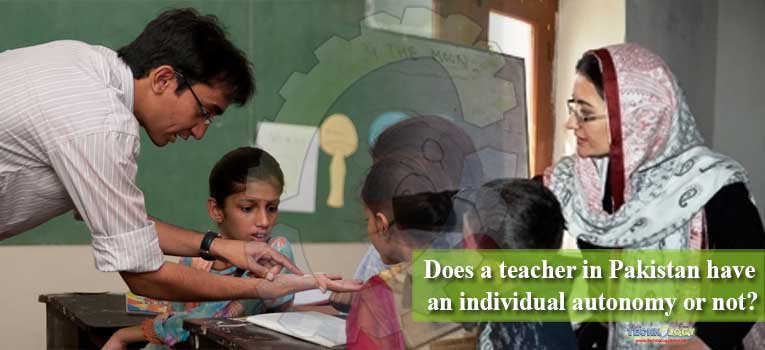There are around one million teachers in our country. The community of teacher in our society stays the most overlooked and denied even socially and financially, etc.
 The qualified staff which is employed by the universities is found incredibly dedicated to other academic work and so they cannot commit completely to even the research intrigue requests of the students.
The qualified staff which is employed by the universities is found incredibly dedicated to other academic work and so they cannot commit completely to even the research intrigue requests of the students.
Teacher autonomy alludes to opportunity of study, learn and educate freely. The educator is the controlling figure of instructive procedure and plays a crucial role in the intensity of social change.But the teachers in Pakistan, despite all the benefits of autonomy of teachers, do not possess complete autonomy.
They could be regarded as partially autonomous in their teaching. They do possess autonomy inside the classroom environment i.e. in deciding timings for test but the dates are still provided by the higher administration or QEC for taking the test.
The teachers are autonomous in their interaction with students within the classroom and to some extent in the activities utilized in the classroom. Other than these two-three areas the teachers do not possess complete autonomy in any other educational scenario. They have to follow the rules and policies devised by HEC and have to meet the deadlines for course completion provided by the institution.
Teachers should be given more autonomy in the classroom. In order for individualized attention at the student level, power has to be shifted downward, towards the educators interacting with the students on the front lines, rather than shifted upward.Autonomy of the teacher is fundamental for guaranteeing a learning situation that focuses on the students’ assorted needs.
Just as the students require freedom of work, space, adaptability and respect, similarly, the instructor also requires the equivalent. Teachers’ autonomy is facilitated by a requirement for improvement in their personality and profession, with the goal that an independent educator may search out circumstances through the span of his or her career to grow further.
The table below shows Leithwood et al’s (1976) review of research into teacher’s autonomy:
| Level of Teacher Autonomy | Area of Responsibility |
| High level of autonomy | · Teacher/Student discussion in class
· Timings for tests · Types of exercises utilized in class |
| Shared autonomy with others | · Objectives
· Material for curriculum · Teaching techniques and methodologies |
| Low level of autonomy – decisions headed by principals and other staff groups | · Outline of curriculum
·Criteria for evaluation of students |
The educational commission should aim to improve the instructors’ status as experts. Educators should discover better and viable strategies for their own proficient development. I firmly believe that right educators with the right frame of mind, furnished with right abilities can have an incredible effect in the improvement of society.
If a teacher is knowledgeable and trained with a sufficient level of autonomy she can do wonders for her students. There ought to be some expert autonomy among the instructors since when they are free to educate, they teach more proficiently and effectively.